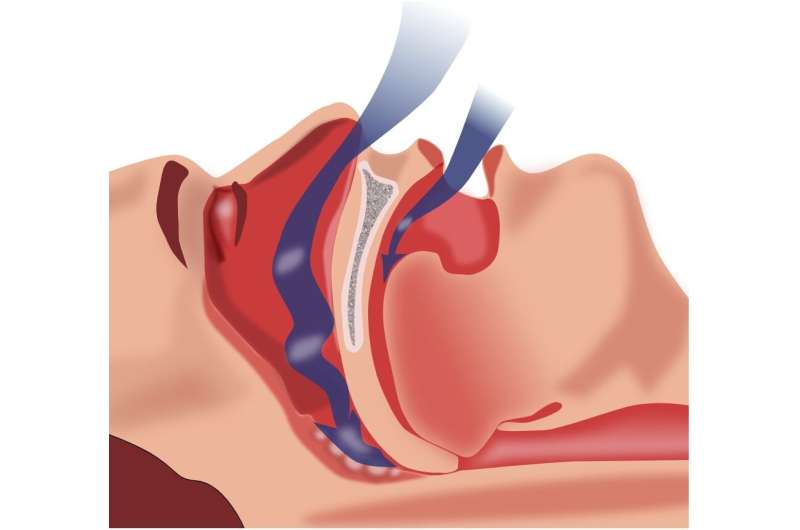This article has been reviewed according to Science X's editorial process and policies. Editors have highlighted the following attributes while ensuring the content's credibility:
fact-checked
trusted source
proofread
TENS machine provides less expensive, non-invasive treatment for sleep apnea

A machine commonly used for pain relief has shown to improve breathing in patients with obstructive sleep apnea, a clinical trial has found.
Results of the TESLA trial, published today in eClinical Medicine by researchers from King's College London and Guy's & St Thomas' NHS Foundation Trust, shows the potential of a new therapeutic option for patients using a transcutaneous electrical stimulation (TENS) machine.
Sleep apnea affects about 1 billion people worldwide, and millions in the UK. The condition can be frequently associated with snoring; people who are affected stop breathing many times during the night. The condition leaves people excessively sleepy during the day, lacking attention, and sometimes experiencing headaches. People diagnosed with sleep apnea are advised not to drive when feeling excessively sleepy.
Many people with sleep apnea may use a continuous positive airway pressure (CPAP) machine, which pumps air into a mask worn over the mouth and nose during sleep. However, only about 75% of patients adhere to CPAP after 3 months, and after five years of treatment this is down to about 25%. Evidence-based alternatives for CPAP are limited, but include a specialized mouth guard which pushes the lower jaw forward—known as a mandibular advancement device (MAD)—and, in some cases, surgical options.
The TENS machine used in the TESLA trial is a small, battery-operated device that has leads connected to sticky pads called electrodes. It is commonly used to reduce pain from conditions such as arthritis, and childbirth labor, but has not been used for people with obstructive sleep apnea before.
The TESLA trial shows this can be an inexpensive and non-invasive treatment method in response. Patients with obstructive sleep apnea were randomized and set to receive either a TENS machine or CPAP. The light and continuous electric stimulation of the CPAP machine is enough to keep the airway open while asleep, allowing easy breathing to continue.
Patients treated with TENS showed improvements in nocturnal breathing and a significant reduction of daytime exhaustion.
The trial also shows that this treatment could be considered for patients who do not respond well to CPAP, providing a second-line treatment that is less expensive and less time-consuming to roll out than current alternatives.
Professor Joerg Steier, a professor of respiratory and sleep medicine at King's College London and a consultant from Guy's & St Thomas' NHS Foundation Trust, said, "Not all patients with obstructive sleep apnea are able to use CPAP therapy, often because the mask can be uncomfortable and in severe cases can lead to sleep deprivation. Alternatives for CPAP include mandibular advancement devices, and sometimes surgical options like hypoglossal nerve stimulation (HNS) which requires a pre-assessment, surgical implantation, activation and follow up appointments.
"In contrast, a TENS machine is non-invasive, has little side effects, and is cheap. The TESLA trial shows us the potential of a new therapeutic option, transcutaneous electrical stimulation, and it will be interesting to see how the method can be used in clinical practice."
A multi-center trial is now being planned to prove efficacy in different health care systems.


















